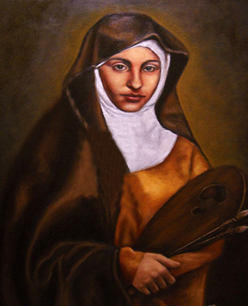| Saints and Theology of the Heart- Life of Saints |
|---|
 |
Feast: March 9 |
St. Catherine was born in Bologna on September 8, 1413. She was the oldest child of John de' Vigri, a rich and cultured man who carried out diplomatic missions for Nicholas III d'Este, Marquis of Ferrara, and Benvenuta Mammolini, a women of great faith. She grew up in her grandparent’s house and was raised by her family members until she was 10 years old. At that time she entered the court of Nicholas III d'Este as lady-in-waiting to Margaret, Nicholas' illegitimate daughter. Catherine became great friends with Margaret and she became very cultured by studying art, music, literature, and Latin. Learning was easy and exciting for Catherine. Even at a young age she was exceptionally prudent, modest, graceful, and kind. Nevertheless, her most incredible and obvious trait was her constant focus on the things of Heaven. At the age of 14, she decided, with her mother’s permission, to join a community of noble women who were dedicating their lives to God. According to Catherine, this decision was made after much prayer day and night. She said that she put all her love in God and that she tried to obtain all the virtues that she witnessed in others so that she could please God more. Throughout her spiritual life, Catherine experienced many sufferings and temptations, particularly the temptation to doubt Christ’s true presence in the Eucharist. However after much suffering, God blessed her with a profound vision of the Real Presence in the Blessed Sacrament. St. Catherine wrote about her battles with the devil so that her sisters could follow her example and ward against all temptations though trust in Jesus and Our Lady. Here are her seven spiritual weapons that she states in her autobiographical and instructive discourse called Seven Spiritual Weapons, which she gave her confessor right before she died: 1. always to be careful and diligently strive to do good; 2. to believe that alone we will never be able to do something truly good; 3. to trust in God and, for love of him, never to fear in the battle against evil, either in the world or within ourselves; 4. to meditate often on the events and words of the life of Jesus, and especially on his Passion and his death; 5. to remember that we must die; 6. to focus our minds firmly on memory of the goods of Heaven; 7. to be familiar with Sacred Scripture, always cherishing it in our hearts so that it may give direction to all our thoughts and all our actions. In accord with her profound humility, St. Catherine served her community in many hidden such as doing laundry, making breads, and taking care of the animals. However, the Lord later called her to be the novice mistress and then to open a new foundation in Bologna. Out of obedience she accepted her new assignments yet she always felt humbly unworthy of such positions. On March 9, 1463 St. Catherine died after much suffering while still consoling those around her and repeating Jesus’ name three times. Catherine was to be canonized by Pope Clement XI on 22 May 1712. Her incorrupt body is preserved in the city of Bologna, in the chapel of the monastery of Corpus Domini. General Audience On St. Catherine of Bologna "She Identifies Seven Weapons in the Fight against Evil" www.zenit.org
|
 Return to main page www.piercedhearts.org This page is the work of the Servants of the Pierced Hearts of Jesus and Mary |